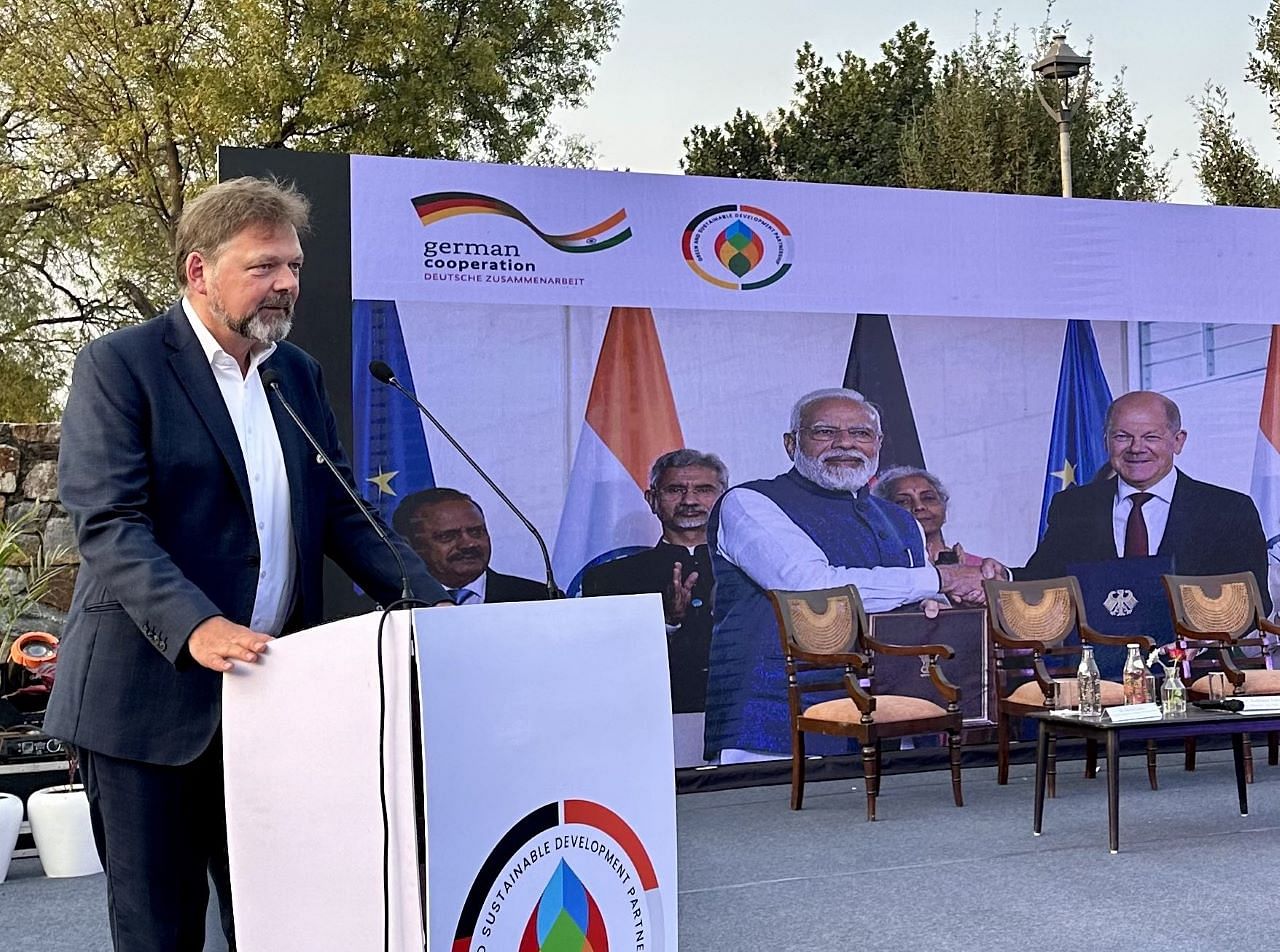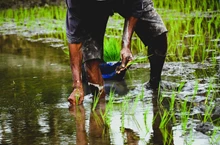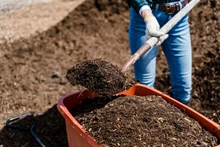
On March 22, 2024, the German Embassy, in partnership with the Federal Ministry for Economic Cooperation and Development (BMZ), launched the inaugural 'GSDP Conversation Series' at Sunder Nursery Park in New Delhi. This initiative marks a significant step in advancing the Indo-German Partnership for Green and Sustainable Development (GSDP). Key topics discussed during the inaugural event include green energy, urban sustainability, and climate resilience, with a specific focus on countries such as Cameroon, Peru, Ghana, Benin, and Malawi.
The first edition of the GSDP Conversation Series focuses on triangular cooperation, where India and Germany collaborate with third countries to address global environmental challenges with localized solutions. Rooted in the agreement signed by Prime Minister Narendra Modi and German Chancellor Olaf Scholz on May 2, 2022, the event highlights the importance of joint efforts in tackling climate change and promoting sustainable development.
Dr. Philipp Ackermann, the German Ambassador to India, emphasized the significance of the Indo-German partnership in combating climate change and fostering sustainable development. He stated, "GSDP stands for Green and Sustainable Development Partnership. With this partnership, India and Germany - two economic powerhouses - are joining forces to develop solutions for climate change and sustainable development. Together, as partners on an equal footing, we want to make real progress in finding solutions to some of the biggest challenges the world faces."
The GSDP aims to strengthen cooperation between India and Germany in alignment with global climate goals and the Sustainable Development Goals (SDGs). Germany plans to allocate at least ten billion euros for this partnership by 2030, demonstrating a firm commitment to sustainable development.
The Indo-German Partnership for Green and Sustainable Development, introduced by Prime Minister Narendra Modi and German Chancellor Olaf Scholz in May 2022, signifies a joint commitment to addressing global challenges. This initiative underscores the importance of shared solutions and collaboration in achieving sustainable development and countering the adverse effects of climate change. With the GSDP, Germany reaffirms its role as India's partner in building a sustainable future.
What better place to talk about the Green and Sustainable Development Partnership than the beautiful @sundernursery in Delhi! Happy to have @MEAIndia on board & present Indo-German innovations in Africa & Latin America! Triangular cooperation combines 🇮🇳 & 🇩🇪 skills & strengths. pic.twitter.com/XstEA7KcRo
— Dr Philipp Ackermann (@AmbAckermann) March 22, 2024
Strategic Priorities of the GSDP
-
Green Energy Transition: Fostering sustainable energy solutions, including renewables, energy efficiency, grid integration, storage, and green hydrogen. The two countries will also work closely to boost manufacturing capabilities.
-
Sustainable Urban Development: Building inclusive, climate-friendly cities with a focus on water, sanitation, waste management, and urban planning.
-
Green Mobility: Supporting efficient, low-carbon urban transportation and promoting wider use of electric vehicles. Climate Change: Pursuing ambitious climate goals under the Paris Agreement, with a focus on reducing greenhouse gas emissions and enhancing resilience.
-
Biodiversity and Forest Restoration: Collaborating to restore forest landscapes, protect biodiversity, and create sustainable livelihoods.
-
Agroecology and Natural Resource Management: Transforming agriculture and food systems towards sustainability based on agroecological principles. The partnership aims at building healthy agroecosystems, while providing safe and nutritious food for all.
-
Marine Litter: Monitoring and preventing litter in marine ecosystems, with an emphasis on reducing plastic waste and improving waste management.
-
Circular Economy: Boosting innovative business models to reduce waste like single-use plastics, design reusable products, and recycle materials. Across these priority areas, India and Germany are also committed to the principles of gender equality and women-led development.
Powering Progress Together
India and Germany tackle pressing issues in the priority areas described above at multiple levels. At the bilateral level, both countries collaborate on concrete technical and financial cooperation projects in the strategic priority areas of the GSDP. In addition, both countries promote exchange between technical experts and maintain a constant policy dialogue through well-established formats such as:
-
The Indo-German Energy Forum (IGEF) facilitates dialogue on sustainable energy, renewable technologies, energy efficiency, green energy financing, and grid integration. In 2022, the forum also established the Indo-German Green Hydrogen Task Force that brings in international expertise to contribute to India’s National Green Hydrogen Mission.
-
The Indo-German Environment Forum (IGEnvF) provides a ministerial-level platform for bilateral cooperation on environmental challenges and international climate policy.
-
The Indo-German Government Consultations and Negotiations on Development Cooperation facilitate a dialogue on core areas of Indo-German technical and financial cooperation such as climate and energy, conserving nature and natural resources, and the transformation of agri-food systems. On this occasion, both sides agree on new concrete projects.
-
Every two years the heads of governments and their cabinets meet for the India Germany Inter-Governmental Consultations (IGC). These consultations comprise a ministerial steering group to provide highest-level coordination and political direction for the GSDP.
In addition to bilateral cooperation, the GSDP extends its impact globally through trilateral and multilateral cooperation. In triangular cooperation projects, India and Germany collaborate with countries in Asia, Africa, and the Indo-Pacific region. This involves sharing experiences and expertise to support sustainable development and achieve climate targets. In Malawi, for example, India and Germany work together to boost women entrepreneurship in the agricultural sector.
In addition, both nations support multilateral initiatives such as the International Solar Alliance (ISA), Coalition for Disaster Resilient Infrastructure (CDRI), and the InsuResilience Global Partnership, which demonstrates how closely India and Germany work together to achieve their shared objectives.
Inclusive and Holistic Partnership
The GSDP has been adopted at the highest level by Prime Minister Narendra Modi and Chancellor Olaf Scholz, reflecting an all-of-government approach. The partnership engages government officials, business leaders, civil society organizations, researchers, and other stakeholders. From Germany’s side, the implementation is carried out by the Deutsche Gesellschaft für Internationale Zusammenarbeit (GIZ) GmbH, KfW Development Bank (KfW), and Physikalisch-Technische Bundesanstalt (PTB).
Staying Informed and Engaged
For the latest developments and information on the GSDP, explore the GSDP Conversation Series, covering panel discussions and dialogues across various cities. A dedicated GSDP website and dashboard launching in 2024 will provide transparency on all projects. In addition, the German Embassy will continue its Climate Talks series which will cover some climate-specific topics under the GSDP. Connect with the German Embassy in India and follow their social media platforms for updates.
The Conversation Series will proceed with sessions held in different Indian cities six times annually. Additionally, the German Government intends to introduce a dedicated GSDP website and dashboard in 2024. Cabinet-level consultations for the next phase are slated for the final quarter of 2024, during which both governments will review progress and introduce fresh initiatives to advance the GSDP.











